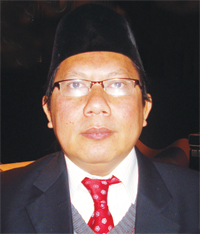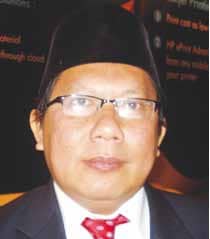 In an exclusive tet-In an exclusive tet-à-tetè with Son Kuswadi, Education Attache, Indonesian Embassy, talks about education state of affairs in Indonesia and how Indian government has been lending a helping hand to improve the situation with Pragya Gupta, digitalLEARNING Bureau……
In an exclusive tet-In an exclusive tet-à-tetè with Son Kuswadi, Education Attache, Indonesian Embassy, talks about education state of affairs in Indonesia and how Indian government has been lending a helping hand to improve the situation with Pragya Gupta, digitalLEARNING Bureau……
Kindly throw some light on education scenario in Indonesia?
We have already achieved 90 per cent of the net enrolment ratio in elementary school but if you talk about higher education our gross enrolment ratio is still 23 per cent in comparison to 17 per cent of India. The basic requirement to improvise education in all sectors is the implementation of ICT. In January, the Indonesian education ministry and the HRD ministry of India have signed a MoU to bring forth the
educational system of both the countries in collaboration. As India is way ahead in engineering studies so this collaboration took place as we, being a neighbour, have just 509 students here in India.
How the country is trying to overcome geographical barriers?
Indonesia being an island, lacks all such benefits, internet facilities at all places, for the wide-spread islets whereas in India we are sure to get the required elements to spread our wings. The western part of our country is already upgraded but the eastern part lacks certain geographical disadvantages, including installation of fibre optic cables. Through Universal Service Obligation (USO) we develop many infrastructures, including telephone and internet, and we have planned to develop the entire system by the end of this year but challenges such as electricity, is a big concern as many villages and remote areas are yet to be facilitated with it. So the basic concern is how to develop ICT even ithout electricity. Solar energy is something we are focusing on but it’s very expensive.
What are you working to progress higher education in Indonesia?
We have only 15 per cent of our lecturers in higher education who hold a PhD degree. Till 2003, we have considered a bachelor degree to be enough for all our lecturers to teach but after that we have made it mandatory that at least a aster degree is must in teaching profession. Although we have certain programmes in our country, but still we are sending over 3,000 teachers for a higher education degree f PhD each across the world. Mostly 50 per cent of our budget to el-
 South KoreaN online education is INS PIRING and we look forward to develop such technology, methodology to enhance our engineering AND tourism students..
South KoreaN online education is INS PIRING and we look forward to develop such technology, methodology to enhance our engineering AND tourism students..
ementary and junior high schools to make education free for all in these levels but the problem is with the expenses associated to schooling. Transportation, uniforms and food take a heavy amount but we have decided to give free meals in schools and also transportation at some places. In the global competitiveness report 2009-10, Indonesia’s Global Competitiveness Index (GCI) rise from rank 54 for 133 countries in 2009, to rank 44 for 139 countries in 2010.
How Indonesia has been addressing the employability issues and how Indian government has been helping your students?
Employability being a major concern, the Indonesian President has decided to look into the human resource part of a student after school and also 13 more such programmes are in the pipeline to benefit students of the country. Our main focus these days is what the industry needs as many graduates of various fields go jobless for the inadequate demand in the market for those types of profiles. Thus we have partnered many industries to train students according to their relevant needs. Our main focus for sending students to India is because of the quality of education that India caters and also besides education education this can develop some long standing relationships with each other as both need something or the other from each other. But the problem is that no such airways directly come to India; a six-hour wastage takes place on the way. Recently when our president visited India, Dr Manmohan Singh confirmed that “visa on arrival” for people from Indonesia.
How do you see the role of ICT in universalising education?
In China we see gadgets are sold off at very cheap prices as the number of experts making these items is high. We want to develop such numbers so that the basic infrastructure of education and employability through Corporate Social Responsibility (CSR) goes high. The present ICT market in our country has the potent to do big but the number is something that bothers us. That’s why we conduct workshops frequently for students and also workers by experts across the world. ICT has transformed us to interact socisialise and ICT change the way of students/ teachers to access the information. education cannot escape from ICT changes, but education takes the active role to leverage the ICT for educational improvement. Reform of education is the key for adapting the changes, and ICT is the vein that facilitate these.
How do you see open and distance learning mode of learning?
We are very skeptical about the open and distance learning as although we are doing it in a very conventional way but as there is no direct involvement of teacher or student it becomes very difficult to maintain the quality. Recently I went to South Korea where the online education system is way ahead of us and we look forward to develop such technology and methodology to enhance our students in engineering, tourism and other fields




















